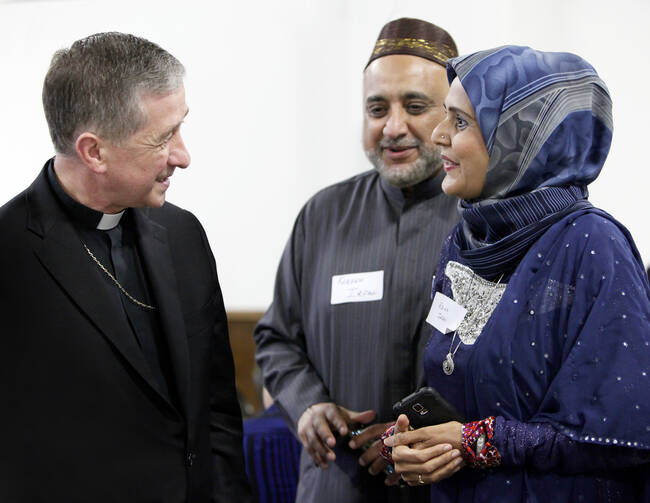Archbishop Blase Cupich’s star burned a bit brighter Thursday morning with news that Pope Francis tapped the Chicago prelate for a post on the powerful Congregation for Bishops, where the 67 year old will help shape the global episcopate and lend a hand in appointing at least two dozen U.S. bishops in coming years.
The news is decidedly “inside baseball,” but it could nonetheless have a profound impact on the types of men chosen to lead the church in the United States and, as a result, shape how the institution interacts in the public square.
The effect of Cupich’s appointment could have big implications for the U.S. hierarchy, where some members have been willing to engage in so-called “culture war” issues, rhetorical combat in the public square that Pope Francis has discouraged.
Cupich, handpicked by Pope Francis to lead the Archdiocese of Chicago in 2014, is by contrast one of a handful of bishops promoted by the pope in recent years who have voiced sympathy for his agenda. Other names that are often included in this group are San Diego’s Bishop Robert McElroy and Santa Fe’s Archbishop John Wester.
At the bishops’ national gathering in November, for example, Cupich took to the floor to express disappointment that immigration reform was not included in the bishops’ five core priorities, while McElroy lamented that the bishops’ voting guide seemed to him to downplay the importance of caring for the environment and combatting poverty.
Of course, the ability of Cupich to influence the American hierarchy is limited to the vacancies that arise during his time on the committee. At least a couple of major sees, including Washington and Boston, are expected to open in coming years, but the leaders of other major archdioceses, such as New York, Philadelphia and Los Angeles, are relatively young.
Appointments to smaller dioceses, however, for which the pope relies on local advice, could remake the face of the U.S. hierarchy.
A handful of U.S. bishops have already reached 75, when they are required to submit letters of resignation, and are awaiting their replacements, including Bishop William Murphy of Rockville Center; Bishop J. Terry Steib of Memphis; and Bishop Paul Loverde of Arlington, Va. At least a dozen more are close to aging out, and among them are bishops who are already classified as “Francis bishops,” including Bishop Gerald Kicanas of Tucson, Bishop Richard Pates of Des Moines and Bishop Stephen Blaire of Stockton, Calif.
Still, these kinds of appointments could perhaps shift priorities at the national level—and they serve as something of a farm system for major archdioceses. (Cupich, for example, was bishop of the relatively small diocese Spokane, Wash., before he was sent to Chicago.)
Critics have argued in recent years that the U.S. Conference of Catholic Bishops has been slow in adopting priorities important to Pope Francis by continuing to focus on fights against same-sex marriage and contentious religious liberty issues. John Gehring, whose book The Francis Effect examines the pope’s impact on the U.S. church, told America he sees Cupich’s appointment as a “home run” that could “reshape the landscape of the American hierarchy in the years ahead.”
“It’s a real signal that the pope wants a U.S. church that is more pastoral and inclusive,” he continued. “My hope is this will lead to more 'Francis bishops' who reject the culture wars and want to build a culture of encounter.”
Other Catholics took to social media to express disappointment with the announcement, but a theology professor at the Catholic University of America urged caution, both in celebrating or lamenting the appointment too zealously.
"I think predictions about every appointment to the Congregation for Bishops are mostly over-politicized and often don't materialize in the way that people expect,” Chad Pecknold told America.
He said it’s important for a wide range of viewpoints to be represented on the congregation in order to serve a diverse church.
“Seeing every appointment as special pleading for different factions distracts us from the way the congregation seeks to work for the common good of the whole church,” he said.
The appointment of Cupich to the Congregation for Bishops comes almost three years after another moderate was placed on the committee, Cardinal Donald Wuerl of Washington, D.C. He replaced another American on the committee at the time, Cardinal Raymond Burke, who has been critical of the Francis papacy.
Just under two years into his role as leader of the nation’s third largest archdiocese, Cupich has wasted little time in wading into some of the church’s most vexing challenges at home and abroad. He was selected by the pope to attend the second part of the synod of bishops’ meeting about family issues last fall, where he supported proposals to relax rules that bar certain individuals from Communion, a position that put him at odds with other members of the U.S. delegation.
He has spoken out frequently about other issues important to the pope, including workers’ rights, the environment and gun violence, which is epidemic in Chicago. But facing declining revenue and parish participation in his archdiocese, the archbishop announced earlier this year that the church in Chicago would undertake a years-long review process that could end with the closure of up to a third of the archdiocese’s parishes.
Cupich will be in Krakow for World Youth Day at the end of July, where Pope Francis will address millions of pilgrims in St. Pope John Paul II’s hometown. The pair met for the first time last June at the Vatican.
Note: This story has been updated to correct an error. An earlier draft stated: "He replaced the only other American on the committee at the time, Cardinal Raymond Burke," but other American bishops were also serving on the Congregation for Bishops at that time.







